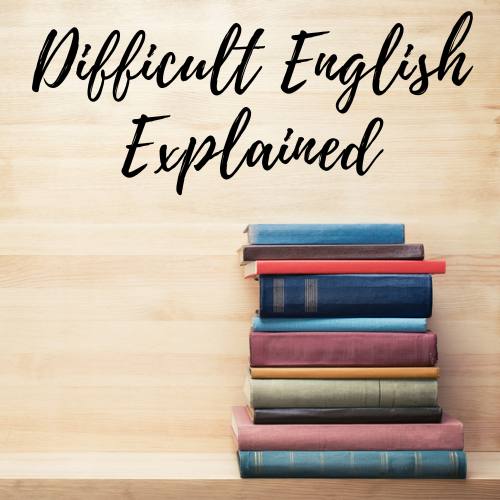Video link: https://youtu.be/9Cs4Zi4IZhw

Students regularly ask me, “How do I know what comes after a verb?” This is a tough question, and it’s no surprise that most EFL textbooks don’t talk much about it. There aren’t any easy answers but at the same time, there are some guidelines.
First, I will explain some words that I will use in this blog post. The first word is “complement.” When I talk about the complement of a verb, I mean a word or phrase that follows the verb and gives us more information. Different verbs can have different kinds of complements. The trickiest kinds are verbs that have other verbs as complements. Here are some examples:
- I want to go to Paris. (“to go” is a complement of “want”)
- I saw him talk to her. (“talk” is a complement of “saw”)
- I enjoy drinking tea. (“drinking” is a complement of “enjoy”)
Example 1 shows a full infinitive as a complement. A full infinitive is “to” followed by the “dictionary form” of a verb. “To want” takes a full infinitive as a complement. In this case, it is “to go.” Example 2 shows a bare infinitive as a complement. A bare infinitive is the “dictionary form” of a verb without “to.” “To see” takes a bare infinitive as a complement. In this case, it is “talk.” Example 3 shows an -ing form as a complement. This is the “dictionary form” of a verb + “-ing.” “To enjoy” takes a verb in the -ing form as a complement. In this case, it’s “drinking.”
In this blog post, I will talk about verbs that take a full infinitive verb (like “to do”) as a complement. First, I’ll talk about what an infinitive verb means when it’s a complement of another verb. Let’s look at an example of the verb “to try.”
- Belle tried to go to the party, but couldn’t get the time off work. (Endley, 2010)
Belle wanted to go to the party but she couldn’t. Infinitive complements often show hypothetical or unrealized situations, and that is certainly what is going on in this example. “To try” in this example has the idea of “attempt.” Other verbs that have the idea of “attempt” follow the same pattern.
- The driver attempted to avoid the ice on the road.
- Even though the customers were rude, Jane struggled to be polite.
- I am making an effort to stay awake.
- No one dared to say anything.
- We must all strive to do better.
In each of the examples I gave, we’re not certain if the action was successful or not. It’s possible, but maybe the action didn’t happen. If we have an unrealized action, something that may or may not have happened, the infinitive verb is most likely to be the right choice. Let’s look at another example:
- Belle tried going to the party, but didn’t like it and left early. (Endley, 2010)
This looks really puzzling because in our earlier example, “try” had an infinitive verb after it. What is going on here? In this example, Belle went to the party and left later. “Try” has a different meaning. It doesn’t mean “to attempt” as it does in the first example. It means “to experiment (with)”. There isn’t an unrealized action here. The action was realized. She went to the party. -Ing complements often show fulfilled or realized situations. (Endley, 2010) That fits with the meaning of “try” in this example. In our first example:
- Belle tried to go to the party, but couldn’t get the time off work. (Endley, 2010)
Belle didn’t go to the party. In our second example, she went. The verb “try” doesn’t have the same meaning in these two examples. The meaning of the verb is what decides if the complement is an infinitive verb or an -ing verb.
We showed how several verbs that have the idea of “attempt” all take full infinitive verbs as complements. “Try, “attempt,” “struggle,” “dare,” and “strive” share a common idea. Are there other groups of verbs like this? Yes!
Verbs with an “intend” idea also can take a full infinitive as a complement. Here are some examples:
- I want to renovate my apartment.
- I intend to go on vacation.
- I need to buy new shoes.
- I plan to sell my car.
- The company is scheming to defraud investors.
There are other groups of verbs like this, but you can see the pattern. With all of these “intend”-type verbs, the action is either hypothetical or it may or may not happen. The complements for these verbs are full infinitives because they show us that the action is unrealized.
References
Endley, Martin J.. (2010) Linguistic Perspectives on English Grammar: a guide for EFL teachers. Information Age Publishing. Kindle Edition.
Larsen-Freeman, D. & Celce-Murcia, M. (2016) The Grammar Book: Form, Meaning, and Use for English Language Teachers, Third Edition. National Geographic Learning, Boston, MA, USA
The Britannica Dictionary, https://britannica.com/dictionary
The Free Dictionary by Farlex, https://www.thefreedictionary.com/
Did you like this blog post? If so, support this content with a donation through Buy Me a Coffee!
Get notifications of new blog posts on my Telegram channel. Register at https://t.me/diffengexplnd
